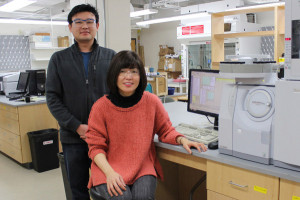
The results from this research show promise in the area of solar and biomass energy conversion.
Image: UW-Madison Chemistry Department
Two researchers are thinking outside of traditional research standards to develop a new approach to solar energy and biomass conversion.
Kyoung-Shin Choi, a professor of chemistry at the University of Wisconsin-Madison, and his postdoctoral researcher Hyun Gil Cha are looking for a whole new way to harness natural energy, and their technique is showing promise for future endeavors.
This from University of Wisconsin-Madison:
They developed a novel PEC setup with a new anode reaction. This anode reaction requires less energy and is faster than water oxidation while producing an industrially important chemical product. The anode reaction they employed in their study is the oxidation of 5-hydroxymethylfurfural (HMF) to 2,5-furandicarboxylic acid (FDCA). HMF is a key intermediate in biomass conversion that can be derived from cellulose — a type of cheap and abundant plant matter. FDCA is an important molecule for the production of polymers.
“When we first started this study, we were not sure whether our approach could be really feasible,” Choi says. “However, since we knew that the impact of the study could be high when successful, we decided to invest our time and effort on this new research project at the interface of biomass conversion and solar energy conversion.”
The researchers expect that this development will result in more diverse and efficient electrochemical and solar-driven processes, which can increase the efficiency and utility of solar fuel.
Interested in renewable energy conversion and storage? Start gearing up for the ECS Conference on Electrochemical Energy Conversion & Storage with SOFC-XIV this July in Scotland by checking out some of our amazing guest speakers!

